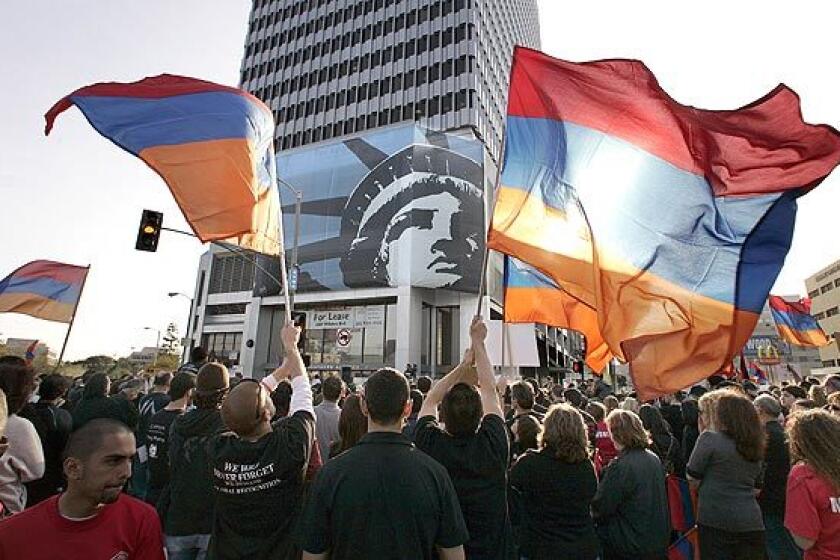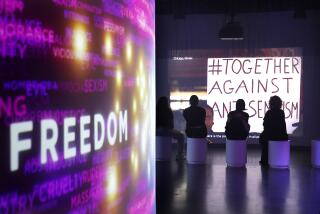For Armenian Americans, Congress’ recognition of their genocide is just part of the battle
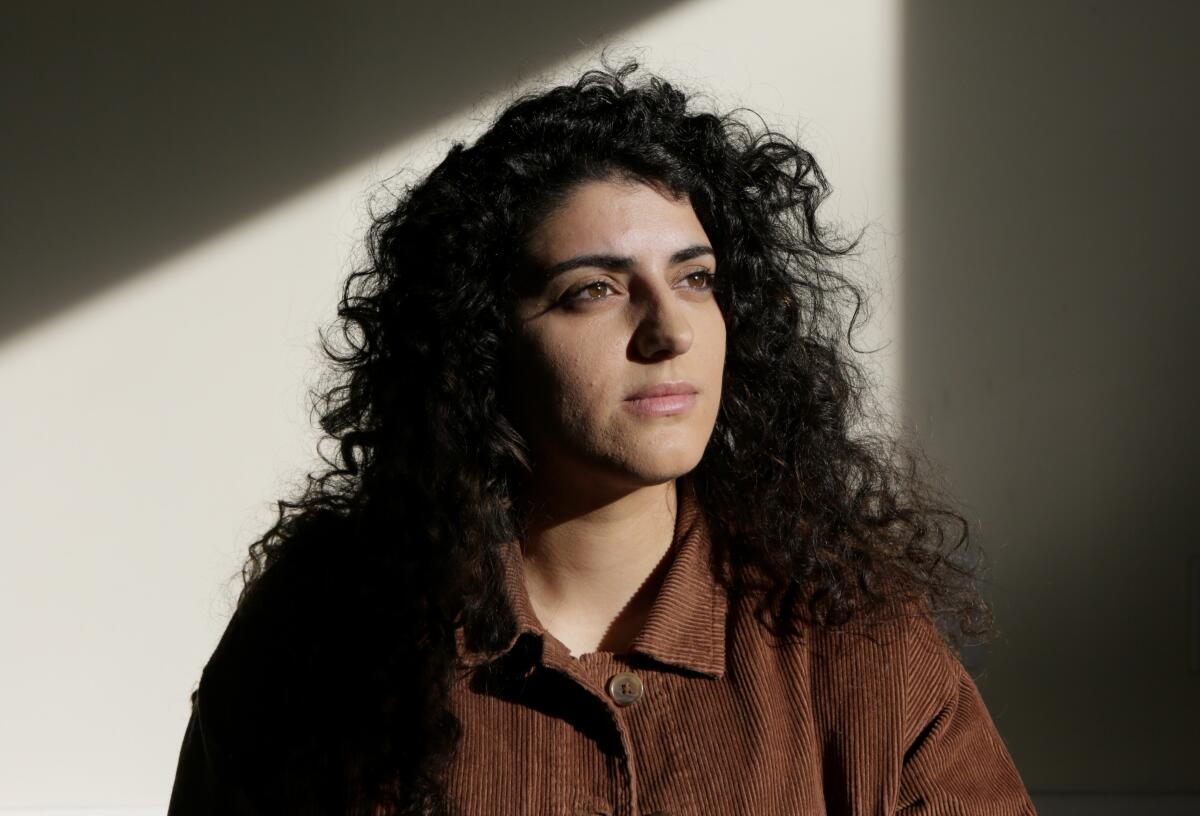
- Share via
For three generations, Sophia Armen’s family has fought for recognition of the massacre that drove its ancestors to the United States.
A community organizer, Armen grew up attending rallies that advocated for U.S. acknowledgment of the 1915-1923 Armenian genocide carried out by Turkey’s Ottoman Empire — the violence that her great-grandparents survived.
As a child she frequented recognition events in Los Angeles with her family and helped gather signatures for petitions. In high school, she and her friends sent letters to their representatives with pictures of their families. In college, she organized events with other communities through the Armenian Student Assn.
Picking at a tray of manti at an Armenian shop in Tujunga one recent afternoon, Armen lamented that many still see the fight for recognition as a passing annual event that affects only a small ethnic enclave in Glendale.
“This only gets attention once a year, on April 24, but it is honestly an everyday thing we are always working on,” she said.
So when the time came this year to once again press Congress to formally recognize the epic slaughter — a move the legislative branch repeatedly had shied from making — the 28-year-old was ready to push. The House on Oct. 29 voted 405-11 to designate the killing of an estimated 1.5 million Armenians as genocide. Yet the Senate resolution had stalled three times before coming to a vote.
The Senate’s nonbinding resolution affirms that a genocide of the Armenian people occurred and that Turkey is responsible.
But on Thursday, the measure recognizing the mass slaughter as a genocide was approved unanimously by the Senate, a rebuke to President Trump, who had sought its delay, and to Turkish President Recep Tayyip Erdogan, who had lobbied the White House to block the designation.
Erdogan, in an Oval Office visit last month, warned of dire consequences for the Washington-Ankara relationship if the “genocide” term were to be formalized. The Senate resolution declared it U.S. policy “to commemorate the Armenian Genocide through official recognition and remembrance” and “reject efforts to enlist, engage, or otherwise associate the United States government with denial of the Armenian Genocide or any other genocide.”
“With this action, the Senate joins the House and its overwhelming vote upholding the proud American record of recognition and condemnation of the Armenian Genocide,” said Armenian Assembly of America Executive Director Bryan Ardouny. “The Congress of the United States of America has spoken.”
The move, Ardouny said, “sends a strong message to the world that the U.S. stands on the side of human rights.”
To Armen, the resolution marked a “day of triumph and justice for our families and our ancestors.”
“We as a community are a force to be reckoned with, because we refuse to give up,” she said. “We won’t be denied.”
In Southern California, home to an estimated 200,000 Armenian Americans, the largest community in the U.S., many in the diaspora say that the fight for recognition of the genocide, though not the sole unifying force, binds Armenians across the globe.
Each year thousands of people march through the streets of Los Angeles demanding that the killings be officially recognized as a genocide.
In 2015, city officials designated Hollywood Boulevard and Western Avenue in Little Armenia as Armenian Genocide Memorial Square. In 2016, Glendale Unified became the first school district in the country to establish a day in remembrance of the genocide.
Rep. Adam B. Schiff (D-Burbank) called the passage of the bill in the House the “high point of a 19-year struggle,” noting that he was “ecstatic” when the bill he’d introduced in every session finally passed.
“And now to see it passed in the Senate, again with overwhelming support, is just wonderful news to an Armenian diaspora that’s been working at this for decades,” he said, adding that it is “now time for the president to do his job” and sign the measure.
Armen’s own last name carries an echo of the genocide. Her great-grandfather’s first name was Armen. As a child, he witnessed Turkish soldiers killing his family and was left to wander through Turkey alone. When he was picked up by American missionaries, they anglicized his name, calling him Albert Armen.
“This might seem overblown to Western audiences, but for a community that has faced ongoing issues of erasure — things like our family name, our connection to land, our connection to culture — it is an everyday existential crisis,” she said of the name change.
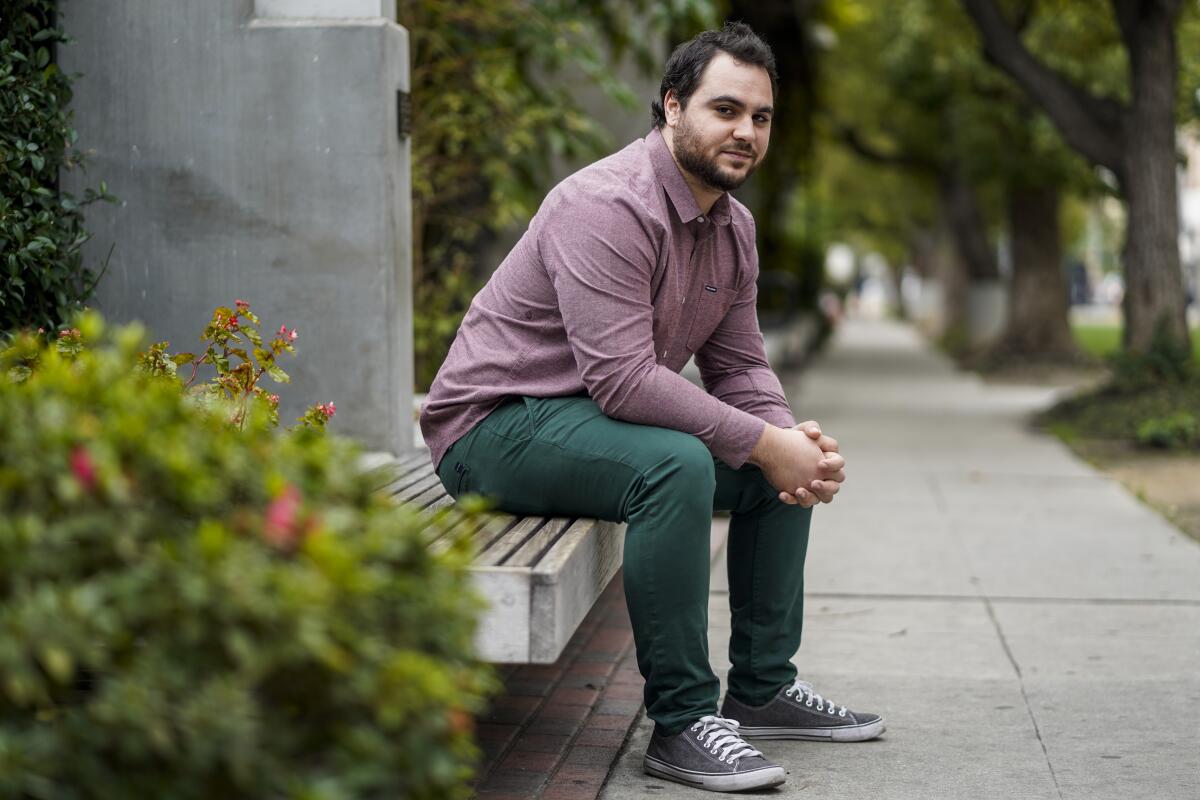
The push for recognition of the genocide began in earnest in the 1980s, when the children of survivors established themselves in the U.S. Armenian Americans grew more politically active, contributing to political campaigns and organizing around the issue.
The survivors didn’t have political, financial, or organizational power, said Syuzanna Petrosyan, associate director of USC’s Institute of Armenian Studies. When the second generation and their children established themselves in the U.S., they felt “secure enough to advocate for what they saw as a domestic issue for them.”
“And in fact, for the U.S., this is a domestic issue as much as it is a foreign policy issue,” she said.
Nora Hovsepian was 10 years old when she learned that her grandmother survived the genocide.
She remembers sitting in her family’s Detroit home, her grandmother sobbing as she told her that as a 9-year-old she watched as Turkish soldiers axed her father, grandfather and uncle to death in front of her eyes. That day in 1915, she said, the women gathered the children, said a prayer and threw themselves into the river on the outskirts of town. Hovsepian’s grandmother survived by clutching a branch in the fast-moving waters. She was rescued by a Kurdish family.
“I think it was literally the first time she had spoken about it,” said Hovsepian, chair of the Armenian National Committee of America’s Western region. “She said, ‘I need to tell you. You’re the future. You need to carry this with you and get justice for our people.’ At the time, they were very lofty words; I felt the burden throughout my life.”
That conversation started Hovsepian on the path toward activism. Now 56, she has dedicated her adult life to advocating for justice for the Armenian genocide.
“To get validation like that is very liberating,” she said, referencing this fall’s congressional action.
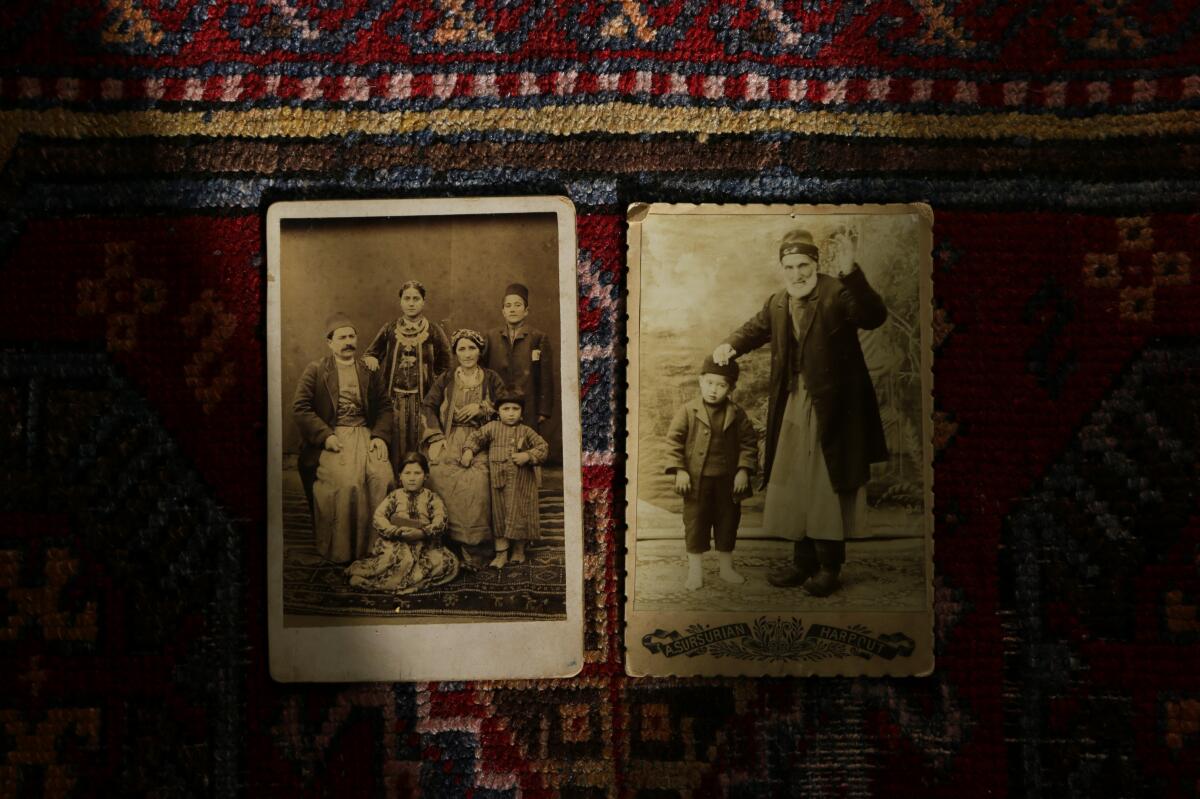
Most states, including California, and several countries have recognized the genocide. Historians have characterized what happened as a precursor of — and even a model for — genocides that followed, including the Holocaust.
“When you don’t recognize and you don’t repair the damages, whatever that may be, you build a foundation for a cycle to take place, and for people to feel empowered and repeat things from the past,” said Shant Shekherdimian, a pediatric surgeon in L.A.
Shekherdimian said he will continue to fight year-round for Armenian interests in the U.S. and work with international programs that help people in the Republic of Armenia.
“I think there should be many other days where I spend as much time and effort in contributing to these issues than that one day on April 24, and I feel strongly about instilling that in my children,” the 40-year-old said. “It’s not about being active on April 24 and passive on the other 364 days.”
While recognition from the U.S. government is important, activists say it is only part of the community’s fight. Some have argued the case for obtaining reparations from Turkey, a shift that’s come as many survivors have died and their children have taken up the cause.
Armenians around the world hold deeds to homes and other properties in Turkey that they argue were stolen from them during the genocide. U.S. recognition of the genocide, some argue, would help survivors and their families to go after what they lost by adding pressure to the Turkish government to pay reparations.
“It’s more than ‘Yay, it passed’ or ‘No, it didn’t.’ It’s important that countries around the world recognize injustice,” said Razmig Sarkissian, a student at Southwestern Law School. “If you don’t, it emboldens other perpetrators to do the same thing. People think they can still get away with it. That reckoning with the past is really important.”
Times staff writers Jennifer Haberkorn and Tracy Wilkinson in Washington contributed to this report.
More to Read
Sign up for Essential California
The most important California stories and recommendations in your inbox every morning.
You may occasionally receive promotional content from the Los Angeles Times.
